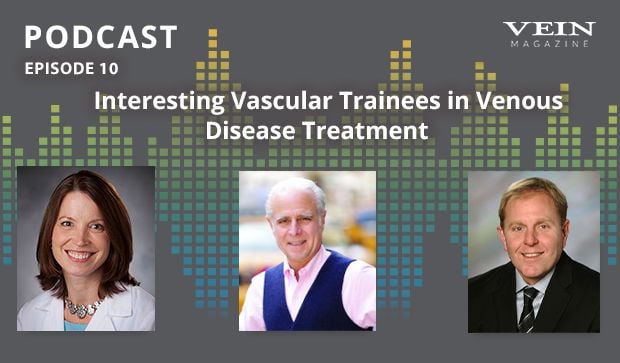
Welcome to the VEIN Magazine podcast with Dr. Steve Elias, where vein specialists sit around, having drinks and talking.
In this episode, Steve is joined by Drs. Ellen Dillavou and Patrick Muck to discuss how to get vascular trainees interested in venous disease treatment.
Special Thanks to our Sponsors
This episode was made possible with support from Clear Sky Local, a marketing company that has worked intimately with vein clinics to help them effectively market their businesses and generate new patients. Find out about their vein clinic accelerator program at www.newveinpatients.com
Subscribe to the VEIN Magazine podcast on iTunes, Apple Podcast, or wherever you listen to podcasts.
Episode Summary
Getting vascular and interventional radiology fellows and residents excited about vein disease is hard, especially when the bulk of their training focuses on arterial care.
Yet, when the residency or fellowship is over and they enter their careers, they are likely to find that up to 80 percent of their patients need treatment for chronic venous insufficiency-related conditions like varicose veins.
That's when the calls come. About 2-6 weeks after graduation, Ellen, a vascular surgeon and program director at Duke University Health System, says the former trainees aren't calling their program directors about endovascular aortic repair, they're phoning about how to effectively treat varicose veins.
Patrick, a vascular surgeon and program director at Good Samaritan Hospital, goes further, saying correspondences can be more targeted, with those wondering how to manage perforators, venous ulcers, deep vein thrombosis, and zoned reflux.
“Those are everyday problems and everyday scenarios,” he said that many of them aren't prepared for. Noting his own career, "I see way more venous patients than I do AAA (abdominal aortic aneurysm) and chronic limb ischemia."
Enriching trainee education on vein disease, they both agreed, equips them to handle such cases and, should they choose to make vein care their specialty, there is a "land of opportunity."
In the world, right now, there are 26 iterations of thrombectomy devices on the market. “That’s a whole big area that needs research and flushing out,” he said unequivocally. “The opportunity for research in the venous world is incredible.”
Ellen agreed, stating that getting research published on venous disease is far easier than with aortic disease and that those studies are enhanced by the sheer number of patients who are accessible. They'll also have greater access to new and upcoming technologies and be able to build relationships with patients, all while having a life of their own.
With more than 50 percent of vascular trainees being women, she said, many will want to start families and need flexibility. “Venous work is a great way to build some flexibility into your schedule. There’s more control over your life as a vascular surgeon.”
The question then becomes how to get program directors and the ADPVS to make venous care an integral part of their training.
The trio thinks venous societies, program directors, and the residents themselves can be the boost this effort needs. An on-the-spot thought from Patrick left him thinking that surveys could be one solution.
Current residents and recent graduates can use the forms to document the types of conditions their clientele regularly present with. Patrick believes the surveys will reflect his and other vascular surgeons experiences. Those findings can be presented to venous societies, program directors, and the APDVS to build a case for making venous care a bigger component of training.
Thank you for joining us. We'd love to hear your thoughts on this episode of the VEIN Podcast. Leave a comment below and subscribe to the VEIN Magazine podcast on iTunes, or wherever you get your podcasts.



